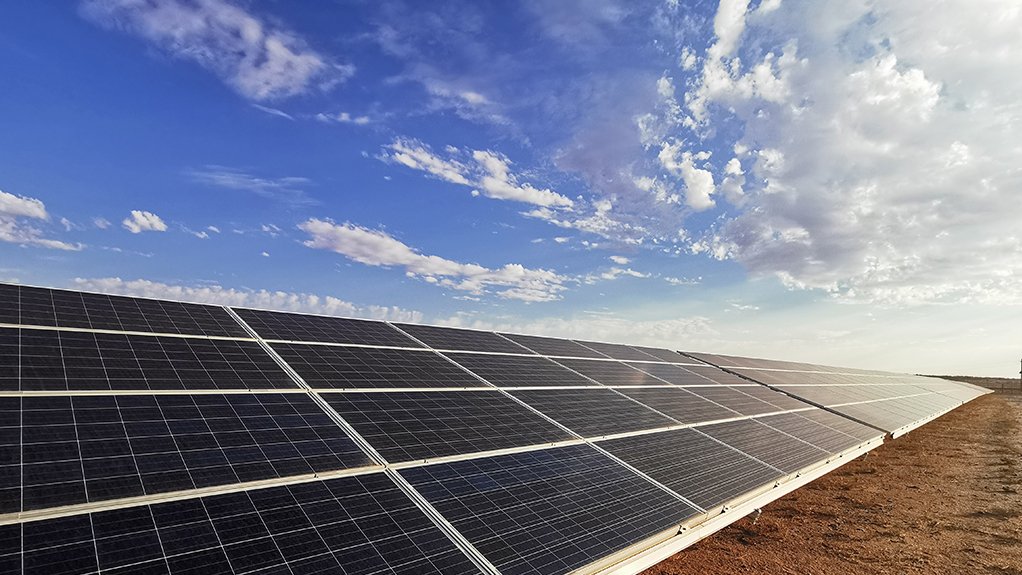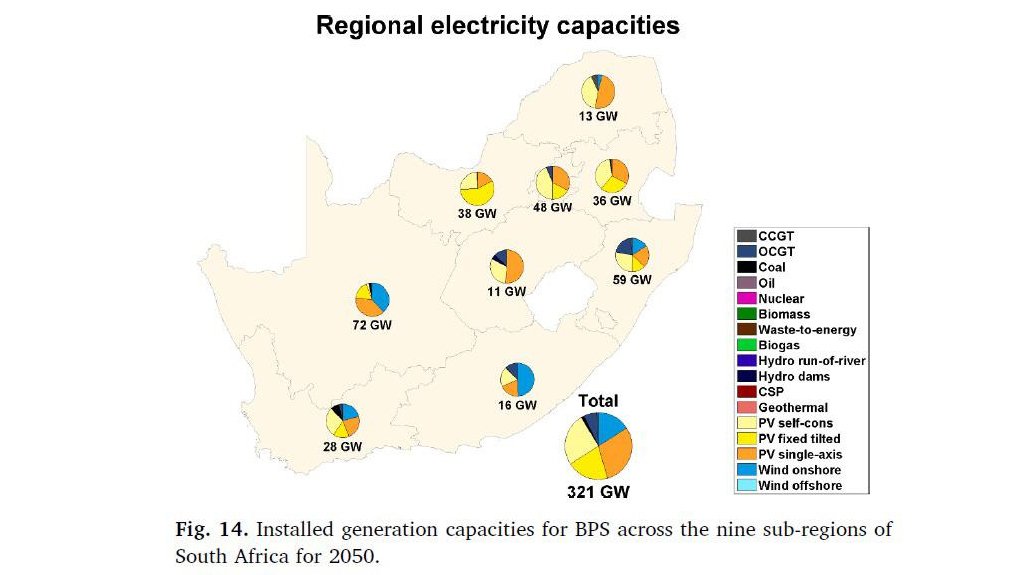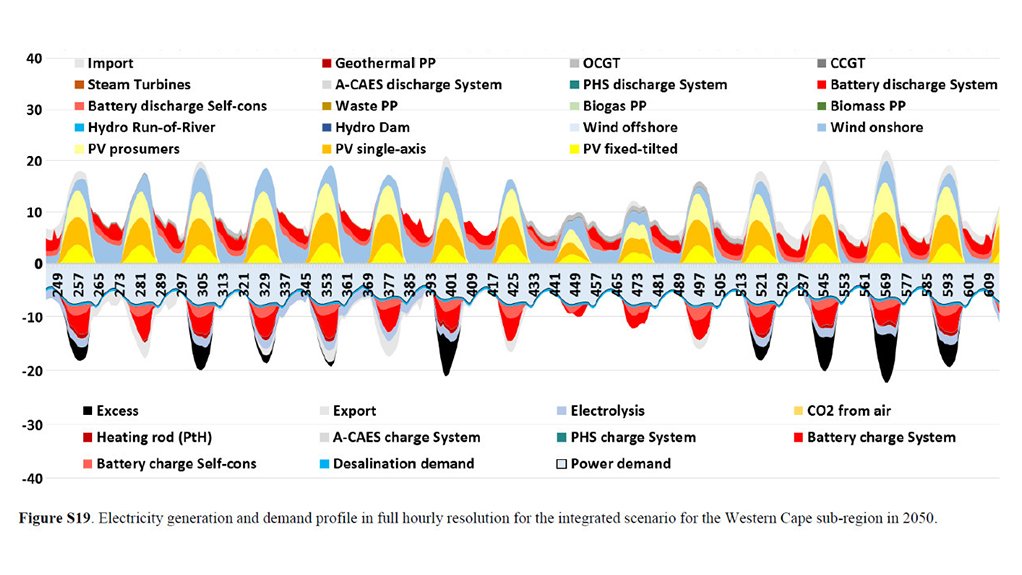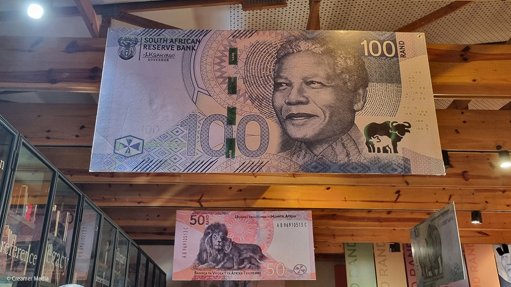New study confirms renewables-based system not only possible but cheapest for South Africa




Photo by Pathway towards achieving 100% renewable electricity by 2050 for South Africa
Photo by Pathway towards achieving 100% renewable electricity by 2050 for South Africa
A new study of South Africa’s electricity system concludes that a fully renewable-energy-based system will be at least 25% more cost competitive by 2050 than the generation scenario currently being considered by policymakers, which still envisages further investments in new coal and new nuclear generation.
The study also concludes that the cost of a renewables-based system could be as much as 50% cheaper once greenhouse gas (GHG) emission costs are factored in. It would also consume less water and create more jobs than a fossil-dominated system.
Published in the latest issue of the Elsevier academic journal Solar Energy, the study has been compiled by academics based at the LUT University, in Finland, namely Solomon Oyewo, Arman Aghahosseini, Manish Ram, Alena Lohrmann and Christian Breyer.
Titled ‘Pathway towards achieving 100% renewable electricity by 2050 for South Africa’, the paper concludes that a renewables-based system is both achievable and a real policy option for South Africa.
The authors argue, therefore, that the country’s energy policy should be immediately revised to place solar photovoltaic (PV) and wind energy at the core of the future electricity system.
Five energy transition scenarios to 2050 are simulated using an hourly resolve model to show how demand is met under each scenario and at what cost. A linear optimisation tool has also been employed to determine the optimal investment and generation technology mix required to meet South Africa’s electricity demand from 2015 to 2050.
The authors conclude that the ‘Best Policy Scenario (BPS) for 2050’ would be one whereby solar PV and wind energy supply about 71% and 28% of the demand respectively.
The scenario excludes GHG emission costs and envisages the system comprising 96% renewables, with the remaining 4% supplied by coal and gas turbines.
The gas turbines included in the model are not run on imported gas and, in later periods, operate using synthetically produced gas, derived from green hydrogen, produced from renewable electricity, or biomethane obtained from upgraded biogas.
No new coal and nuclear power plants are installed in the least-cost pathway, and existing fossil fuel capacities are phased out based on their technical lifetime.
Storage technologies, transmission grids and gas power plants provide the required flexibility, with the large share of solar PV resulting in a correspondingly large share of battery storage to meet daily requirements. Gas storage, meanwhile, becomes prominent to balance seasonal variations once variable renewable-energy penetration reaches more than 90% in around 2040.
“The levelised cost of electricity increases just slightly from 49.2 €/MWh in 2015 to 50.8 €/MWh in the BPS, whereas it increases significantly to 104.9 €/MWh in the Current Policy Scenario (CPS) by 2050,” co-author Breyer tells Engineering News Online.
“Further, without considering GHG emissions costs, the cost of electricity increases slightly, from 44.1 €/MWh in 2015 to 47.1 €/MWh, in the BPS and increases up to 62.8 €/MWh in the CPS by 2050.”
In other words, the cost of electricity is 25% lower in the BPS than in the CPS. Once GHG emission costs are included, the cost gap when compared with the CPS widens to 50%.
Under the BPS, freshwater consumption for electricity production is estimated to fall by 99% by 2050 when compared with the 0.331 km3 consumed by the coal fleet in 2015. Under the CPS, consumption falls by a more modest 38%.
The number of direct energy jobs created in the BPS are forecast to grow from around 210 000 in 2015 to nearly 408 000 by 2035, before stabilising and steadily reducing to over 278 000 by 2050. By contrast, jobs created in the CPS are stable with a marginal decrease to around 184 000 by 2050. Most of this increase in employment arises as a result of the installation of new capacity, which creates construction and installation jobs.
The authors state that further research should be conducted to incorporate additional energy sectors, such as transport, heat and industry, for a wider analysis of the South African energy transition.
“The results of our study indicate that a 100% renewable energy system is the least-cost, least-water intensive, least-GHG-emitting and most job-rich option for the South African energy system in the mid-term future,” Breyer concludes.
Article Enquiry
Email Article
Save Article
Feedback
To advertise email advertising@creamermedia.co.za or click here
Comments
Announcements
What's On
Subscribe to improve your user experience...
Option 1 (equivalent of R125 a month):
Receive a weekly copy of Creamer Media's Engineering News & Mining Weekly magazine
(print copy for those in South Africa and e-magazine for those outside of South Africa)
Receive daily email newsletters
Access to full search results
Access archive of magazine back copies
Access to Projects in Progress
Access to ONE Research Report of your choice in PDF format
Option 2 (equivalent of R375 a month):
All benefits from Option 1
PLUS
Access to Creamer Media's Research Channel Africa for ALL Research Reports, in PDF format, on various industrial and mining sectors
including Electricity; Water; Energy Transition; Hydrogen; Roads, Rail and Ports; Coal; Gold; Platinum; Battery Metals; etc.
Already a subscriber?
Forgotten your password?
Receive weekly copy of Creamer Media's Engineering News & Mining Weekly magazine (print copy for those in South Africa and e-magazine for those outside of South Africa)
➕
Recieve daily email newsletters
➕
Access to full search results
➕
Access archive of magazine back copies
➕
Access to Projects in Progress
➕
Access to ONE Research Report of your choice in PDF format
RESEARCH CHANNEL AFRICA
R4500 (equivalent of R375 a month)
SUBSCRIBEAll benefits from Option 1
➕
Access to Creamer Media's Research Channel Africa for ALL Research Reports on various industrial and mining sectors, in PDF format, including on:
Electricity
➕
Water
➕
Energy Transition
➕
Hydrogen
➕
Roads, Rail and Ports
➕
Coal
➕
Gold
➕
Platinum
➕
Battery Metals
➕
etc.
Receive all benefits from Option 1 or Option 2 delivered to numerous people at your company
➕
Multiple User names and Passwords for simultaneous log-ins
➕
Intranet integration access to all in your organisation





















